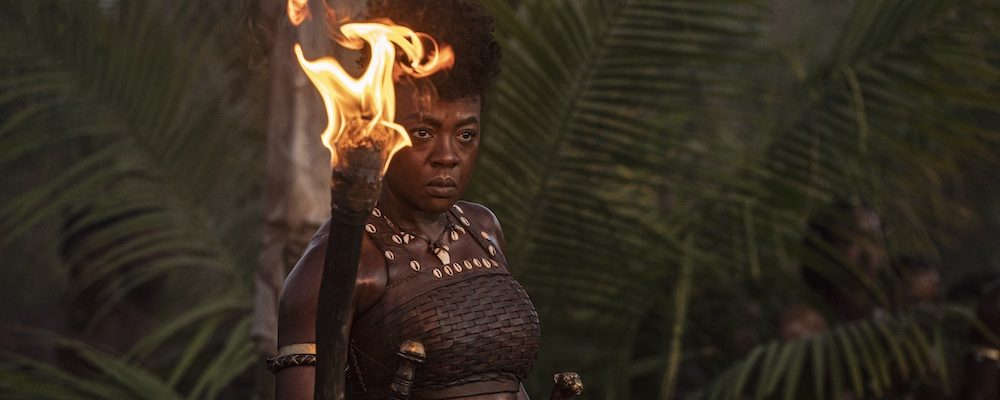‘The Woman King’: Viola Davis Leads a Powerful Sisterhood as a Fearsome Warrior
Sandra Miska
Viola Davis, one of our greatest living actresses, channels her inner warrior in historical epic, “The Woman King.” The Oscar winning stars as Nanisca, the fearsome general of the Agojie, an all-female army that fights for the Kingdom of Dahomey in West Africa. The audience sees her fascinating world through the eyes of Nawi (Thuso Mbedu), a soldier in training who has a similar indomitable spirit. Both actresses give award-worthy performances as their characters walk the fine line between being vulnerable and being fearsome.
Mostly secluded within the walls of the palace when they are not fighting, the women who make up the Agojie are, for the most part, orphans, captives and those who have been cast off by their families. Nawi is part of the latter category, as she is dropped off at the palace doors by her irate father after sabotaging her arranged marriage with a rich but odious older man. The 19-year-old is headstrong and does not follow direction well, which makes her stand out in a unit in which obedience and uniformity is a must. She butts heads with Nanisca, who is not a control freak, but an experienced leader who has certain rules in place to protect those under her command from being needlessly killed.
While Nanisca and Nawi are fictional characters, the Agojie and Dahomey (located within present-day Benin), were very real, and the film gives the viewer an engrossing glimpse into the politics of West Africa during this time, 1823. John Boyega gives a regal performance as real-life king Ghenzo. While he and Nanisca have a great deal of respect for each other, she speaks out against his practice of selling enemy captives to European slave traders, which she opposes on moral grounds. She would rather they go all in on exporting palm oil.
Hero Fiennes Tiffin represents the European slavers as Santo, a Portuguese man from Brazil who has a tenuous business relationship with Ghenzo. Accompanying him to Africa is Malik (Jordan Bolger), a biracial man whose mother was from Dahomey. It was her dying wish for her son to see her homeland, and there is an immediate spark between him and Nawi. However, as a female soldier, she is forbidden to marry or have children, an unfair double standard in her eyes. As for Malik, he is an intriguing character because he is caught between two worlds. Santo looks down on him and many of the West Africans view him as a slaver.
Overall, there is a lot to cheer for in “The Woman King,” a film made by women. It was directed by Gina Prince-Bythewood from a script written by Dana Stevens, who developed the story with actor Maria Bello. Part of Nanisca’s traumatic backstory includes being a sex slave, which we see fragments of in flashbacks, but are spared anything too gratuitous. This is a story about resilience and bravery, and Davis and Mbedu shine brilliantly in rousing battle scenes, as well as during the quieter moments of bonding and reflection. The film is shot well, and the West Africa we see here is a rich, vibrant land full of multiple cultures, far from the dark place slavers and colonizers from that time have described. If there are any weaks spots in “The Woman King,” it is a contrived twist, along with some clichéd lines about sacrifice.
“The Woman King” releases Sept. 16 in theaters nationwide.

